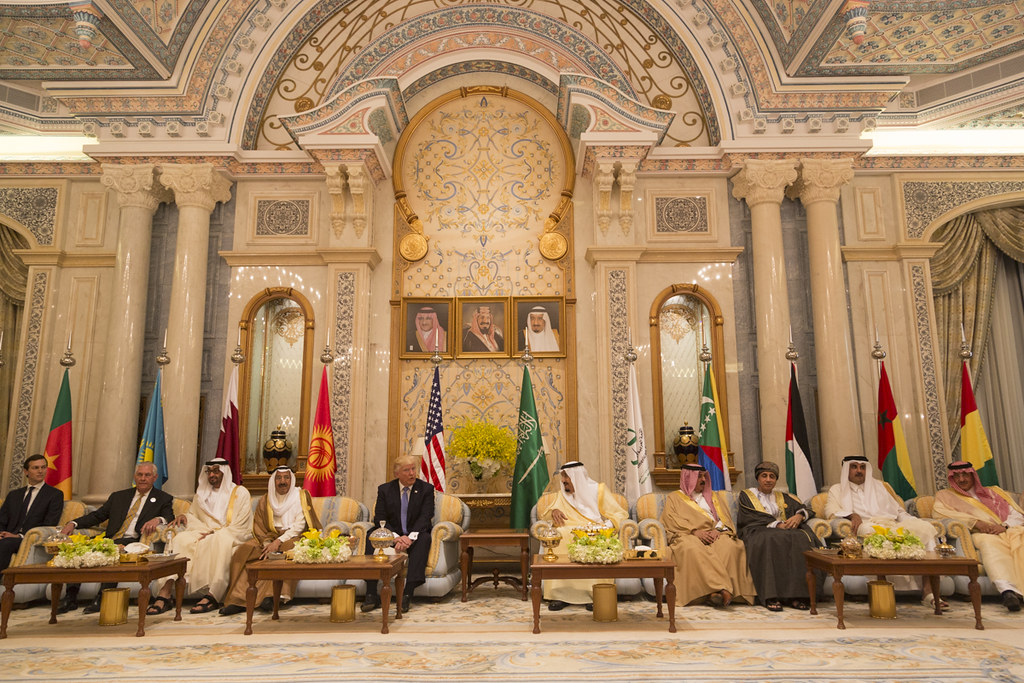Implications of President Trump’s Tariff Policy for Gulf States
Ahn So Yeon (SNUAC)
On April 2, U.S. President Donald Trump announced the imposition of large-scale reciprocal tariffs on America’s trading partners, effectively marking the onset of a trade war. As countries around the world closely monitor the potential ramifications of this policy shift, Gulf States—currently prioritizing ambitious economic reform—remain highly vigilant.
The newly introduced 10% tariff is not expected to exert a significant direct impact on the Gulf economies. The Trump administration exempted oil and gas exports to the United States from the scope of the tariffs. Given that Gulf States’ energy exports to the U.S. comprise less than 3% of their total exports, and hydrocarbons were specifically excluded, the decision has been received as a favorable development by oil-exporting countries in the region.
However, the Gulf States are unlikely to remain insulated from the broader economic disruptions triggered by this protectionist policy. Intensifying tensions between the U.S. and China, along with the global spread of protectionism, have fueled concerns over a potential economic slowdown and rising inflationary pressures. In this context, a projected decline in global oil demand poses additional challenges, with indirect repercussions expected to reverberate across Gulf economies.
For Gulf countries pursuing wide-ranging economic diversification agendas, oil revenues continue to serve as a critical source of fiscal support. Consequently, any sustained downturn in global demand and oil prices could undermine the long-term viability of their reform efforts. Moreover, given the region’s heavy reliance on imports across multiple sectors, surging inflation is likely to adversely affect domestic consumption and overall economic stability.
Meanwhile, President Trump announced plans for his first overseas visit since taking office, scheduled for May, with stops in Saudi Arabia, the United Arab Emirates, and Qatar. The visit is expected to result in the signing of major investment agreements, including arms deals involving U.S.-manufactured defense equipment.
미국 트럼프 관세 정책 발표에 따른 걸프 국가들의 영향
안소연 (아시아연구소)
지난 4월 2일 미국 트럼프 대통령은 미국의 무역 파트너 국가들을 상대로 대규모 상호주의적 관세를 부과하겠다고 발표하면서 무역 전쟁의 서막을 열었다. 많은 국가들이 트럼프 관세 정책 발표에 따른 파급효과에 주목하고 있는 가운데 경제 개혁에 사활을 걸고 있는 걸프 국가들도 촉각을 곤두세우고 있다. 이번에 새롭게 부과된 10% 관세는 걸프 국가들에게는 큰 영향이 없을 것이라는 전망이다. 트럼프 행정부는 미국으로의 석유 및 가스 수출에 대한 관세 부과 대상에서 면제하는 조치를 취했다. 걸프 국가들의 대미 석유 가스 수출량은 총 수출량의 3% 미만에 불과하며 탄화수소에 대한 관세를 부과하지 않았다는 점에서 걸프 산유국에게는 긍정적인 소식이라고 할 수 있다. 하지만 이번 관세 정책으로 세계 경제에 혼란을 가져올 것으로 예상되는 상황 속에서 걸프 산유국들은 간접적 영향을 피하기 어려울 전망이다. 미-중 갈등 고조, 보호무역주의 확산이 예상되는 가운데 세계 경제 성장이 둔화되고 인플레이션이 악화될 것이라는 우려가 심화되고 있다. 이에 따라 세계 석유 수요가 감소할 것이라는 전망이다. 따라서 걸프 산유국 경제에도 어느 정도 간접적인 영향을 미칠 것으로 예상된다. 특히, 광범위한 경제 개혁 프로젝트를 추진하는 걸프 국가들에게 석유 수익은 여전히 중요한 자본의 원천이라는 점에서 장기적으로 부정적 파급 효과를 가져다 줄 수 있다. 또한, 다양한 분야에서 수입에 의존하는 걸프 국가들에게 인플레이션 상승은 걸프 국가 내수 경제에도 타격을 줄 것으로 보인다.
한편, 트럼프 대통령은 취임 후 첫 해외 순방으로 5월 중 사우디아라비아, UAE, 카타르를 방문할 것이라고 밝혔다. 이번 방문을 통해 미국 무기 구매를 포함한 대규모 투자 협정이 체결될 전망이다.

